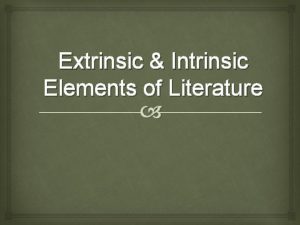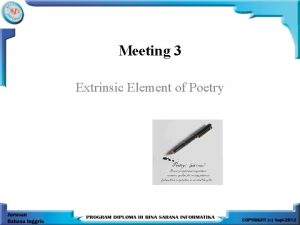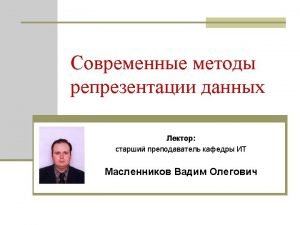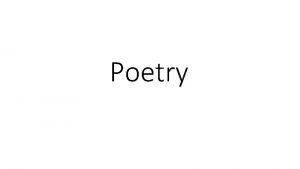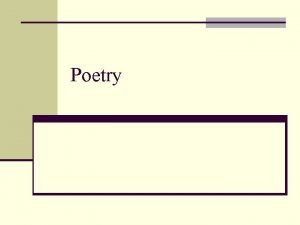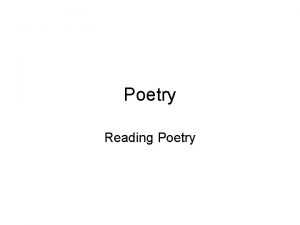Meeting 3 Extrinsic Element of Poetry Extrinsic factors







- Slides: 7

Meeting 3 Extrinsic Element of Poetry

Extrinsic factors are the literary elements / factors which can be found outside the literary works but it is indirectly influence the structure of the literary works. It is focused on the background, history, social conditions and biography of the author. Sometimes, it connects literature to the social context and psychology as well.

According to Wellek & Warren (1956), part of which includes extrinsic elements are as follows: • Circumstances of individual subjectivity authors who have attitudes, beliefs, and outlook on life that these things affect the making of literary works. • Psychological state, psychological well the author, psychological readers, as well as the application of psychological principles in the work. • Author of circumstances, such as economic, social, and political. • View of life of a nation, the various works of art, religion, and so forth. Background of the author’s life as part of the extrinsic elements affects works of literature. For example, the author of a particular area of cultural backgrounds, are consciously or unconsciously, will incorporate elements of culture into literature.

Literature and Biography • Biography may give any contribution to the making of literary works. • From a biography, we will not only know the genius, moral, intellectual and emotional development of a man but we may learn the psychology condition and author creative process.

Literature and Psychology • Psychology can explain about the creative process. • A study of revisions, corrections, and the like has more which is literarily profitable, since, well used, it may help us perceive critically relevant fissures, inconsistencies, turnings, distortions, in a work of art (Wellek and Warren, 1977: 91).

The influence of extrinsic factors • Extrinsic elements become an integral part of the building works of literature. • Extrinsic elements give color and flavor to literature, which in turn can be interpreted as meaning. • Extrinsic elements that affect the work can also be used as a portrait of objective reality at the time the work was born. So that we as readers can understand the psychological mood state of society and author at the time.

The examples … • Siti Nurbaya Novel has brought Minangkabau culture to the story. This is consistent with the background of its author, Marah Rusli, which originated from Minangkabau region. He described the culture of its origin into the taste of his literary works • Sigmund Freud found his works were almost same with Dostoyevsky’s The Brothers Kamarazov, in Hamlet, in Diderot’s Neveu de Rameau, in Goethe. He was well educated in Austria and respected the classical works of Greeks and German literature.
